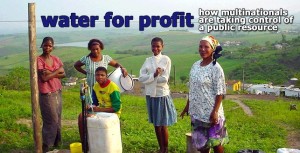 The struggle to provide safe, adequate water and sanitation in South Africa is a more complicated story than the events in Cochabamba, Bolivia. South Africa — a democracy since the end of apartheid in 1994 — is one of the few nations that guarantees a constitutional right to “sufficient” water: “Everyone has the right to have access to … sufficient food and water.” The country has not been able to deliver enough water to many of its poorer citizens, however.
The struggle to provide safe, adequate water and sanitation in South Africa is a more complicated story than the events in Cochabamba, Bolivia. South Africa — a democracy since the end of apartheid in 1994 — is one of the few nations that guarantees a constitutional right to “sufficient” water: “Everyone has the right to have access to … sufficient food and water.” The country has not been able to deliver enough water to many of its poorer citizens, however.
The system for providing water in South Africa is complex. It includes government policy makers, Water Boards, and local municipalities. With the end of apartheid, some cities turned to giant water corporations in France and Britain to manage their water utilities. In other cities, water utilitites remained public, but began to operate like a private business. For the poor, the experience was the same – water sold for a profit.
The World Bank has encouraged a policy of water privatization ever since the neoliberal policies of Reagan and Thatcher came into favor in the 1970s. The Bank acknowledged that the poor would stop paying for water once the cost was more than five percent of income. In South Africa, privatized water can cost up to 20 per cent of income. The poor were forced to choose between water and food.
Monthly water rations
In 2001, 10 million South African households were cut off from water when they were unable to pay. The country, which had been free of cholera for decades, experienced a three-year epidemic affecting over 100,000 people. Cholera is spread by unclean drinking water and poor sanitation.
That same year, the government agreed to a program that would supply 25 liters of free water a day for each person. Half that amount is enough to flush a toilet once.
The initial monthly ration of water may have been free, but once the allotment was used up, there was no more water for the rest of the month. According to the World Health Organization, 25 liters might be enough to provide for the most basic needs of a family, but it was not enough for long term survival or for the sanitation and hygiene needs of a dignified life.
Prepaid water meters
The supply of water was controlled by prepaid water meters, installed for each household. Once the initial free allocation was exhausted, the water meters prevented additional water from flowing. That included emergency situations, such as the need to put out a fire. When a fire broke out in Phiri, an urban neighborhood of Soweto in Johannesburg, the outcome was tragic.
At around two o’clock in the morning on 27 March 2005, Phiri resident Vusimuzi Paki awoke to the shouts of a tenant, who was trying to put out a fire in one of the other backyard shacks on Paki’s property. Assisted by neighbours, the first crucial minutes were spent trying to extinguish the fire using the pre-paid water meter supply that the Johannesburg Water company had recently installed to control the residents’ water supply. However, the water pressure was insufficient to make much impact on the fire and, after a while, the pre-paid meter water supply automatically disconnected due to insufficient water credit.
Residents were then forced to scoop up ditch water with buckets in a desperate attempt to put out the fire. More minutes passed. One neighbour tried to telephone the police at Moroka police station but no one answered the phone. After battling for an hour, residents finally put out the fire, but not before the shack had burnt to the ground. It was only after Paki’s tenant returned home from her night shift that everyone discovered to their horror that her two small children had been sleeping in the shack. They both died in the fire.
Continued in the next post.
Related posts:
Water privatization: An investment bonanza
The Cochabamba water wars
Resources:
Image source: CBC News
Bob Carty, Whose hand on the tap? Water privatization in South Africa, CBC News, February 2003
Partick Bond and Jackie Dugard, The case of Johannesburg water: What really happened at the pre-paid ‘Parish pump’, African Journals Online, Vol. 12, No. 2, 2008


[…] As in Columbia, strong local activism against water privatization, has forced some communities to abolish the pre-paid water meters that led residents to drink contaminated water, causing a resurgence of cholera (see http://www.thehealthculture.com/2010/11/water-privatization-in-south-africa-prepaid-meters/). […]